
August-Wilhelm Scheer is a German Professor of business administration and business information at Saarland University, and founder and director of IDS Scheer AG, a major IT service and software company. He is known for the development of the Architecture of Integrated Information Systems (ARIS) concept.

Manfred von Ardenne was a German researcher and applied physicist and inventor. He took out approximately 600 patents in fields including electron microscopy, medical technology, nuclear technology, plasma physics, and radio and television technology. From 1928 to 1945, he directed his private research laboratory Forschungslaboratorium für Elektronenphysik. For ten years after World War II, he worked in the Soviet Union on their atomic bomb project and was awarded a Stalin Prize. Upon his return to the then East Germany, he started another private laboratory, Forschungsinstitut Manfred von Ardenne.
The German National Academy of Sciences Leopoldina, short Leopoldina, is the national academy of Germany, and is located in Halle (Saale). Founded on January 1, 1652, based on academic models in Italy, it was originally named the Academia Naturae Curiosorum until 1687 when Emperor Leopold I raised it to an academy and named it after himself. It was since known under the German name Deutsche Akademie der Naturforscher Leopoldina until 2007, when it was declared to be Germany's National Academy of Sciences.
Stuart Stephen Papworth Parkin is an experimental physicist, IBM Fellow and manager of the magnetoelectronics group at the IBM Almaden Research Center in San Jose, California. He is also a consulting professor in the department of applied physics at Stanford University and director of the IBM-Stanford Spintronic Science and Applications Center, which was formed in 2004.

Volker Braun is a German writer. His works include Provokation für mich – a collection of poems written between 1959 and 1964 and published in 1965, a play, Die Kipper, and Das ungezwungene Leben Kasts (1972).
Eric R. Fossum is an American physicist and engineer known for co-developing the CMOS image sensor. He is currently a professor at Thayer School of Engineering in Dartmouth College.
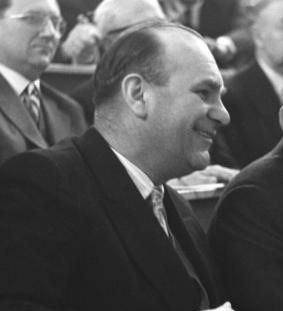
Heinz Barwich was a German nuclear physicist. He was deputy director of the Siemens Research Laboratory II in Berlin. At the close of World War II, he followed the decision of Gustav Hertz, to go to the Soviet Union for ten years to work on the Soviet atomic bomb project, for which he received the Stalin Prize. He was director of the Zentralinstitut für Kernforschung at Rossendorf near Dresden. For a few years he was director of the Joint Institute for Nuclear Research in Dubna, Soviet Union. In 1964 he defected to the West.

Robert James Mair, Baron Mair, is a geotechnical engineer and Emeritus Sir Kirby Laing Professor of Civil Engineering and director of research at the University of Cambridge. He is Head of the Cambridge Centre for Smart Infrastructure and Construction (CSIC). He was Master of Jesus College, Cambridge, from 2001 to 2011 and a fellow of St John's College, Cambridge, from 1998 to 2001. In 2014 he was elected a vice president of the Institution of Civil Engineers and on 1 November 2017 became the Institution's president for 2017–18, its 200th anniversary year. He was appointed an independent crossbencher in the House of Lords in 2015 and is currently a member of its Select Committee on Science and Technology.
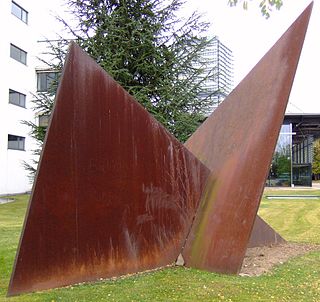
Hermann Glöckner was a German painter and sculptor. He was an important representative of constructivism.
Max Uhlig is a German painter. He won the Hans Theo Richter-Preis of the Sächsische Akademie der Künste in 1998.

Peter Scholze is a German mathematician known for his work in arithmetic geometry. He has been a professor at the University of Bonn since 2012 and director at the Max Planck Institute for Mathematics since 2018. He has been called one of the leading mathematicians in the world. He won the Fields Medal in 2018, which is regarded as the highest professional honor in mathematics.

Detlev Ganten is a specialist in pharmacology and molecular medicine and is one of the leading scientists in the field of hypertension. He founded the World Health Summit in 2009. He was Chairman of the Foundation Board of the Charité Foundation (2005–2015), editor of the Journal of Molecular Medicine, Chairman of the Board of Trustees of the Max Planck Institute of Colloids and Interfaces and Max Planck Institute of Molecular Plant Physiology as well as Chairman of the Board of Trustees of the Ethnological Museum Dahlem of the Prussian Cultural Heritage Foundation.
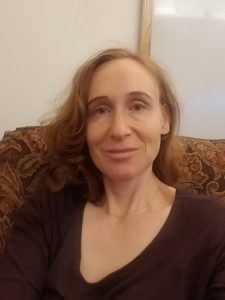
Julia Kempe is a French, German, and Israeli researcher in quantum computing. She is currently the Director of the Center for Data Science at NYU and Professor at the Courant Institute.
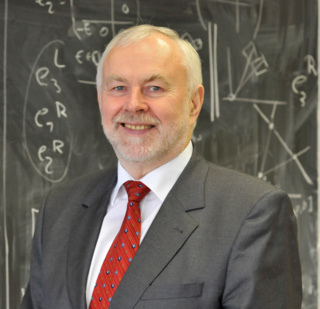
Martin Grötschel is a German mathematician known for his research on combinatorial optimization, polyhedral combinatorics, and operations research. From 1991 to 2012 he was Vice President of the Zuse Institute Berlin (ZIB) and served from 2012 to 2015 as ZIB's President. From 2015 to 2020 he was President of the Berlin-Brandenburg Academy of Sciences and Humanities (BBAW).

Lieselott Herforth was a German physicist and politician. She was a member of the State Council and the People's Chamber of the GDR and she was the first rector of a university in Germany.
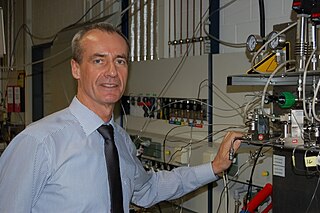
Jürgen Caro is a German chemist.

Heinrich Gottlob Bertsch was a German chemist. He is considered the inventor of the world's first fully synthetic detergent.

Frank Schneider is a German musicologist.

Jürgen W. Czarske is a German electrical engineer and a measurement system technician. He is the director of the TU Dresden Biomedical Computational Laser Systems competence center and a co-opted professor of physics.

Eberhard Hermann Erich Zeidler was a German mathematician, who worked primarily in the field of non-linear functional analysis.















